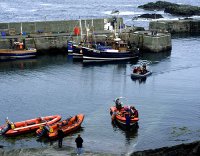 |
|
|||||||||||||||||||||||||||||||||||||
|
||||||||||||||||||||||||||||||||||||||
|
|
||||||||||||||||||||||||||||||||||||||
|
||||||||||||||||||||||||||||||||||||||
|
The St. Abbs and Eyemouth Voluntary Marine Reserve was opened on the 18th of August 1984 by Sir David Bellamy, who plunged into the sea from St. Abbs harbour wall. As a voluntary reserve, protection of the marine life relies on the goodwill of the numerous groups of people who use the area and adhere to the Code of Practice. The settlements of St. Abbs and Eyemouth both owe their existence to the fishing industry. Indeed Eyemouth harbour is now the base of a thriving offshore fishery. The smaller boats operating out of St. Abbs fish the productive waters for crabs and lobsters using the traditional method of laying baited pots or 'cribs'. The waters around the Berwickshire coast have long been considered as special by marine biologists and their wildlife has been much studied. The water itself is unusually clear, in contrast to the more silt-laden coastal waters further to the north or south. These clear waters and spectacular underwater scenery have attracted increasing numbers of scuba divers to the area over the last couple of decades. The wildlife itself has some unusual constituents; animals like the fearsome looking wolf-fish which is common in Arctic waters, but are not found much further south of the reserve. Side by side with the wolf-fish, you can find species like the Devonshire cup-coral, an Atlantic species normally limited to the warmer waters of the south and west coast of Britain. Its presence here is due to a small finger of the North Atlantic Drift which extends over the northern tip of Scotland, carrying the larvae of this and other warmer water species. The value of the marine reserve is enhanced by the fact that it lies within several other conservation areas. The most recent is the Berwickshire and North Northumberland European Marine Site (EMS) which has been designated under the European 'Habitats' Directive. The EMS protects habitats such as the rocky reefs, sea caves and cliffs for breeding sea birds against any damaging practices. Adjacent to much of the coastal boundary of the marine reserve lies the St. Abbs Head National Nature Reserve. This is one of the largest onshore breeding colonies for seabirds such as Guilliemots, Razorbills, Kittiewakes, Puffins, Shags and Fulmars. The best time to visit is in the spring and early summer when the cliffs are bustling with life and you can watch chicks taking the leap of faith off the cliffs and trying out their wings for the first time. It is not necessary to don aqualung equipment to appreciate and enjoy the wildlife of the marine reserve. This web page aims to help you appreciate the variety of life in the sea - Britains last true wilderness, and to show you what you can see and do from the shore without getting wet!
|
|
||||||||||||||||||||||||||||||||||||
|
St. Abbs & Eyemouth Voluntary Marine Reserve. |
||||||||||||||||||||||||||||||||||||||


